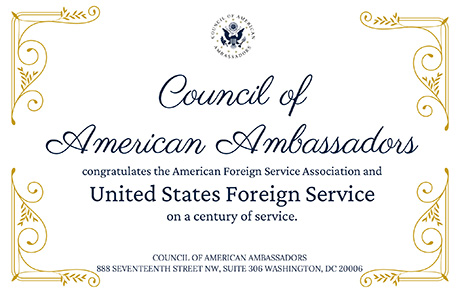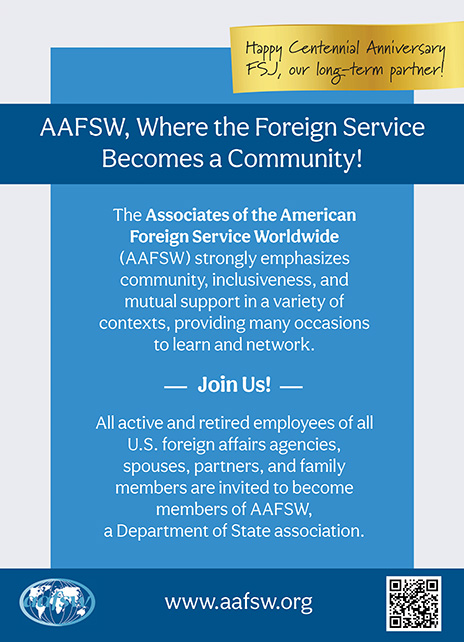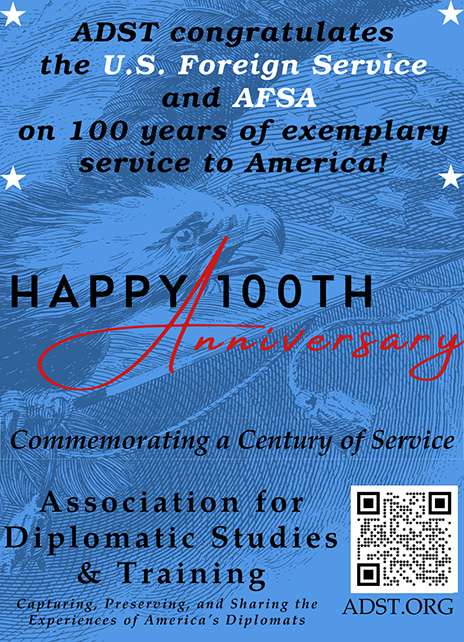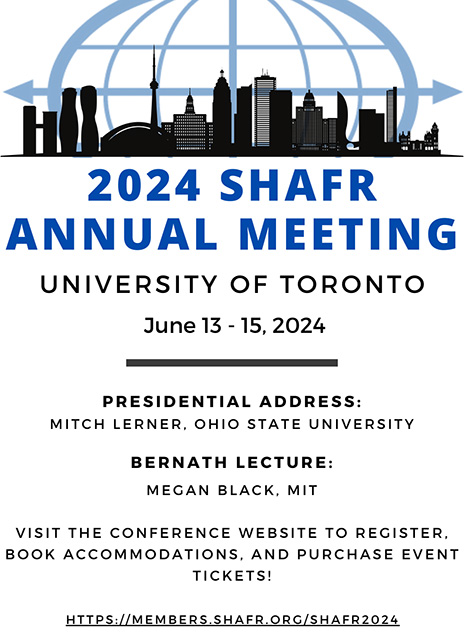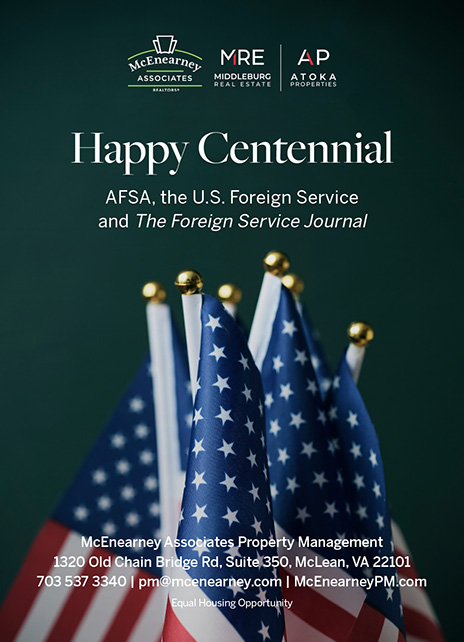Foreign Service Proud: 100 Words for 100 Years
As AFSA and the FSJ began planning for dual celebrations of the 100th anniversary of the modern Foreign Service and the 100th anniversary of AFSA, we asked members of our community to share—in 100 words—moments when they felt Foreign Service proud. They did not disappoint.
We hope the resulting stories, from all corners of the globe and across decades, will help expand public understanding of the important work that the Foreign Service does every day, overseas and at home.
—The FSJ Team
China: Lockdown in Shanghai
KRISTIN BUCHANAN
I was most proud to be a part of the Foreign Service during Shanghai’s brutal 61-day lockdown in the spring of 2022. The consulate in Shanghai went on ordered departure, and a small team of consular officers remained at post to assist American citizens in distress.
We continued providing special and routine consular services, including Consular Report of Birth Abroad interviews, in front of the apartments where American families were locked down. We facilitated the release of American citizens from their residences to travel to the airport to board flights to safety, maintained communication with Americans who tested positive for COVID-19 and were sent to makeshift quarantine camps, and tracked threats of violence against Americans during a time of intense anti-foreigner sentiment.
This was all accomplished while we were locked down ourselves, denied access to our offices. The dedication, resilience, and resourcefulness shown by this skeleton crew will stay with me for the rest of my career, and everyone I served with became a lifelong friend.
Saudi Arabia: A Woman at the Table
AMBASSADOR RACHNA SACHDEVA KORHONEN
I arrived in Dhahran, Saudi Arabia, at the end of July 2017, a few days before Eid al-Fitr, the end of the holy month of Ramadan. As the first woman consul general (CG), I was told that I was not invited to the official breakfast held by the governor; and, in fact, I would only be able to visit a few of the many families the previous CGs had visited. It was sobering. I still have the note from our local staff listing which families would accept a woman guest and which would not.
Over the next year, I got to know our Saudi hosts, and slowly they grew more comfortable with me. I was no longer a female CG, just the CG. I wasn’t invited in 2017, but in 2018 I became the first and only woman to attend the Emir’s breakfast. That year, along with my team, I visited more than 100 homes during Ramadan and Eid. So many Saudi women have since told me that seeing me as the only woman with all those men gave them the courage to ask for their own invitations.
Ours is the only country in the world that dares take the chance of sending a woman (a brown one, no less) to a place where we had been sending men for more than 75 years. I am so proud to be an American.
Nepal: Assistance After Disaster
BRONWYN LLEWELLYN
After the 2015 Nepal earthquake, U.S. Embassy Kathmandu literally opened its doors to help. At one point we were feeding about 600 people—American citizens, Nepali local staff, and others—as well as rapidly repurposing our development programs into disaster relief operations, facilitating U.S. military aid, coordinating with other donors, fielding calls from loved ones looking for family members, helping tourists get plane tickets home, and even physically going out to help dig latrines or hand out supplies to those who had lost everything. We showcased the best of America then, and I am proud to have been a part of it.
Worldwide: Promoting Wellness
ASTER HELEN TECLEMARIAM
As a medical provider in the Foreign Service, I have had the privilege of serving our country in posts around the world. Since I joined in 2009, my journey has taken me to Sri Lanka, Moldova, Algeria, Israel, Pakistan, South Sudan, Iraq, South Africa, Washington, D.C., and Türkiye. Each assignment has been a unique and fulfilling experience, allowing me to immerse myself in different cultures and make a positive impact on the health and well-being of our diplomatic community. Being part of the Foreign Service has not only allowed me to do the job I love but has also instilled a sense of pride in representing our nation on the international stage.
Indonesia: Reducing Greenhouse Gas
AMBASSADOR BOB BLAKE
While I was ambassador to Indonesia from 2013 to 2016, then–Secretary of State John Kerry asked us to figure out how we could help Indonesia reduce its greenhouse gas (GHG) emissions.
We developed a composite of the most progressive sustainability policies of the palm oil companies operating in Indonesia, validated that with national and international nongovernmental organizations working on climate and environment in Indonesia, and then quietly got the agreement of the major palm oil companies. Indonesia’s Chamber of Commerce finally carried this forward as a made-in-Indonesia initiative.
GHG emissions from deforestation have fallen steadily since then.
India: The Dying American
AARON H. PRATT
I was serving as a consular officer in India in 2017. Donald was an American retiree, residing in Chennai. He was in and out of consciousness, the same way he had been in and out of touch with his family. I took his hand. “My name is Aaron. I am from the United States consulate. If you understand, squeeze my hand.” His hand pressed mine. “I’ve talked to your daughters. They are coming. If you understand, squeeze my hand.” He pressed again. “They want you to know they love you.” He squeezed many times, each weaker. He was gone when they arrived. We wept together.
Vietnam: O Positive
AMBASSADOR TED OSIUS
At 6:10 p.m. on Oct. 26, 1996, I was the embassy duty officer when Marines patched through a call from a provincial hospital in remote Yên Bái province, northwest of Hanoi. A 36-year-old American had been hit by a truck while riding a motorcycle. He had suffered massive internal injuries and was bleeding to death.
I called the embassy doctor, who told me to collect O positive blood. Thirteen members of the embassy community came forward to donate, waiting their turns until 2 a.m., none of them complaining. Embassy drivers took the doctor and a makeshift ambulance across the rough roads to reach that American.
I called his parents in Peoria, Illinois. Distraught, his mother said to me: “Please, please save him. I’ve already lost one son. I can’t lose another.”
At 6 a.m., doctor and patient boarded an evacuation flight with several liters of O positive blood.
In Singapore, the doctors said that our efforts, and especially the donated blood, had saved the American’s life.
Russia: Thanked by a Great Artist
MARY KRUGER
In the mid-1990s, after the collapse of the Soviet Union, expat Russian artists who had been banned from the USSR began to return to the country. Many made a stop in St. Petersburg, where, as public affairs officer, I was lucky to attend many of their performances.
One evening the renowned cellist and human rights defender Mstislav Rostropovich performed in the St. Petersburg Philharmonic Hall. Exiled from the USSR many years earlier, he had found a home in the United States as the musical director of the National Symphony Orchestra in Washington, D.C.
After the concert I was invited backstage. As I introduced myself and held out my hand to thank him for a moving performance, Rostropovich instead enveloped me in a bear hug and said: “Allow me to thank you, as the representative of the country that gave me and my family refuge at our moment of need.”
I was caught by surprise and profoundly humbled that such a great artist would thank me, a mid-level FSO, for something I clearly had nothing to do with. But I was also proud that, for a moment, I was not just an FSO but something much greater—I was the embodiment of a country respected and admired around the world for its defense of human rights and willingness to help the persecuted.
Honduras: 47 Orphans Under One Roof
CHERRY GWYN CREAGAN
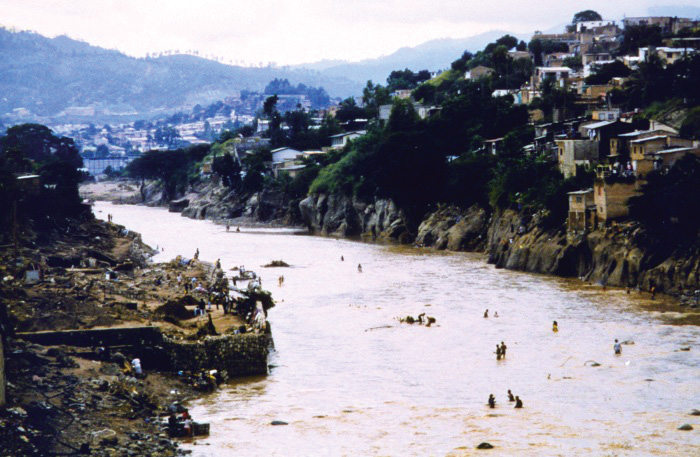
Tegucigalpa, Honduras, in the aftermath of Hurricane Mitch. More than 9,000 deaths and 9,000 missing were attributed to Mitch, making it the second-deadliest hurricane in history.
Debbie Larson / Wikimedia Commons
The 180 mph winds of Category 5 Hurricane Mitch that had punished the island of Guanaja and the North Coast of Honduras diminished as the storm moved inland and headed straight for the capital. Rain had been falling for four days in Tegucigalpa, where we lived alongside a million Hondurans. Torrents of water transformed normally placid streams, sweeping away everything in their path: giant boulders, trees, bridges, houses, cattle, and people.
My husband, Jim Creagan, had been ambassador there since 1996, and our oldest son, Kevin, was visiting. We were worried about the children in the orphanage on the riverbank, where I had worked for two years. We couldn’t reach the nuns. Horrified, we watched the TV coverage of rising waters destroying all but one bridge separating us from them. Kevin said: “Mom, I’ve got to go to them.” I was terrified that the last bridge wouldn’t hold. But he went.
That night Kevin saved all 47 children and sisters just before the orphanage was inundated. He brought them to our residence, where they lived for the weeks it took to repair their home. During that time, Jim worked nonstop, coordinating rescues using U.S. troops, organizing distribution of food aid and supplies, and even at one point rescuing the president of the country.
The outpouring of help from people all over the United States was tremendous. President Bill Clinton and First Lady Hillary Rodham Clinton, former President George H.W. Bush, and many from Congress came to Honduras to pledge support. We were so proud of our fellow Americans’ response and happy our Foreign Service family could make a difference.
Washington, D.C.: USAID on the Hill
ANDREW PARKS
My proudest experience as an FSO occurred in 2023, when I served on the Hill as a USAID-sponsored legislative fellow. I was a foreign policy adviser to Senator Edward Markey, who gave me freedom to propose and pursue any ideas I had to offer. I took this once-in-a-lifetime opportunity to improve USAID programs and broader foreign policy.
For example, on behalf of the senator, I wrote an oversight letter to the Administrator that distilled the history of USAID’s workforce challenges and underscored solutions. I also used my experience in Haiti to draft a letter to President Joe Biden that laid out a framework for improving Haitian security and addressed the humanitarian crisis there. Finally, I drafted legislation that, if passed, will push the Centers for Disease Control and Prevention to reduce the pet import burdens for U.S. government personnel serving abroad.
Croatia: Are You Real?
TOM SELINGER
I was dressed as Santa again, this time helping our Marine Security Guards deliver Toys for Tots to children in a Croatian orphanage in 2005. As I passed out gifts, a little girl—too young to have experienced the war but living the aftermath—climbed into my lap, eyes brimming with hope, and whispered, “Are you real?”
I had practiced my jolly “Sretan Bozic [Merry Christmas]!” but wasn’t ready for this question. I paused and thought about my work helping this young country, barely a decade old, face its war legacy and pursue reforms to earn NATO membership, and about our mission that day to share the embassy community’s generosity.
“Yes,” I whispered back proudly in Croatian. “I’m real. What about you? Are you real?”
She giggled and nodded, gave my stuffed Santa belly a big hug, and scampered off with her toy.
Syria: A Threat in Damascus
MIRIAM ASNES
Crouched under my desk in the consular section of Embassy Damascus on July 11, 2011, I and the other consular officers and local staff called out to each other, making sure everyone was OK as government thugs swarmed the embassy walls. We were a solid team, brought together by the adversity of assisting U.S. citizens during Bashar al-Assad’s brutal crackdown against Syrian citizens demanding more democratic and pluralistic governance.
Under the leadership of Ambassador Robert Ford, every member of the embassy staff walked away unharmed that day, and we continued to serve the American people by maintaining an active U.S. diplomatic presence in Syria for another seven months.
Mozambique, Guinea-Bissau, Chad: Reaching Hard-to-Reach Audiences
KRISTIN M. KANE
I am proud of using public diplomacy tools and strategic outreach at the height of the U.S. wars in Iraq and Afghanistan to convince skeptical Muslim audiences on the Swahili coast at Mozambique’s (stunningly gorgeous) northern tip that we were not anti-Islam. I’m proud of getting to the hardest-to-reach audiences in places like Guinea-Bissau and Chad, nations with such deep and long-term instability that even the smallest programs and outreach go a long way.
I’ve noticed that we have the most impact in the hardest places; and I have therefore found those Foreign Service assignments the most challenging but also the most rewarding.
Cuba: Hurricane in Havana
AMBASSADOR JENNIFER JOHNSON, AMY COX, AND JENNIFER MULLARKEY
When a Category 5 hurricane swept through Havana in 2017, at the height of the “anomalous health incident” [or Havana syndrome] scare, some evacuated, 25 hunkered down at the ambassador’s residence, and a dozen stayed at the embassy. People left their roles behind and pitched in—collecting consumables and creating a dining hall, caring for pets and children, and delivering supplies using chain saws to cut through downed trees to reach people.
It was a scary, emotional time, with empty containers crashing into the chancery building and coastal water flooding the embassy. Afterward, it continued to be an all-hands-on-deck effort to assess damage, coordinate relief supplies, and get the embassy back up and running. We were so proud to see our brave colleagues give it their all to overcome the multiple challenges.
Worldwide: Advancing U.S. Goals on Three Continents
CONARD HAMILTON
For opportunities to make a difference, the Foreign Service never disappoints! From supporting consular teams deploying to Japan after the tsunami and nuclear meltdown there in 2011, to helping evacuate our mission in Venezuela in 2019 and subsequently creating a platform from which they could continue the mission in Colombia, to ensuring our missions to Poland and Ukraine got the personnel they needed in the aftermath of Russia’s full-scale invasion of Ukraine—I am proud to have been a small part of advancing U.S. goals on three continents. My story is not unique. Everyone I work with puts themselves in positions to make an impact. That is why I love this career.
Rwanda/Burundi: The Unrest Next Door
HEATHER CHASE
In 2015 I was on my first assignment, to the then-quiet, stable country of Rwanda doing low-volume, low-stress consular work. Then, all hell broke loose next door. There was a military takeover in Burundi, with gun battles in the streets … and our colleagues were still at post with their families.
After three tense, busy days, the looks of relief on colleagues’ and private citizens’ faces as they came off the evacuation plane and saw our small team standing behind a table draped in an American flag is something I will never forget.
Belgium: No Language Barrier
JUDITH M. HEIMANN
In mid-1987, when Belgium had its turn to preside over the political cooperation meetings of the European Union, I was warned by my boss, the political counselor, that the U.K. and France were anxious that the U.S. not know the details of what was said during such meetings. (The E.U. is a rare international organization in that it includes many Western countries, but the U.S. is not—and is never expected to be—a member.)
During my first visit to the Belgian foreign ministry’s two permanent staffers on Africa, they implied that they were drafting confidential messages to those expected to attend a meeting on African issues. I asked them (in English) what might be raised there. One of the staffers turned to the other and began speaking Flemish, a language used in two-thirds of Belgian homes but seldom with foreigners. I broke in right away, saying, “Ik spreek Nederlands.”
They grinned and switched to English, but they seemed more forthcoming than I had expected. And, indeed, when I came to see them after the Africa meeting, one of them walked me to the elevator afterward and slipped into my hand the minutes—in Flemish—of the meeting I had asked about.
Surprised and delighted, I concluded that this was their way of thanking me for helping them avoid saying something in my presence they would not have wanted an outsider to hear. Our mutual trust grew, lasting for another decade, when I unexpectedly became a retired but rehired Foreign Service annuitant and was working in Brussels once again.
Vietnam: An Immigrant Serving Immigrants
TOM ZIA
I am proud to be a Foreign Service officer and an immigrant who serves as the immigrant visa chief (in Ho Chi Minh City), enriching lives and my country simultaneously.
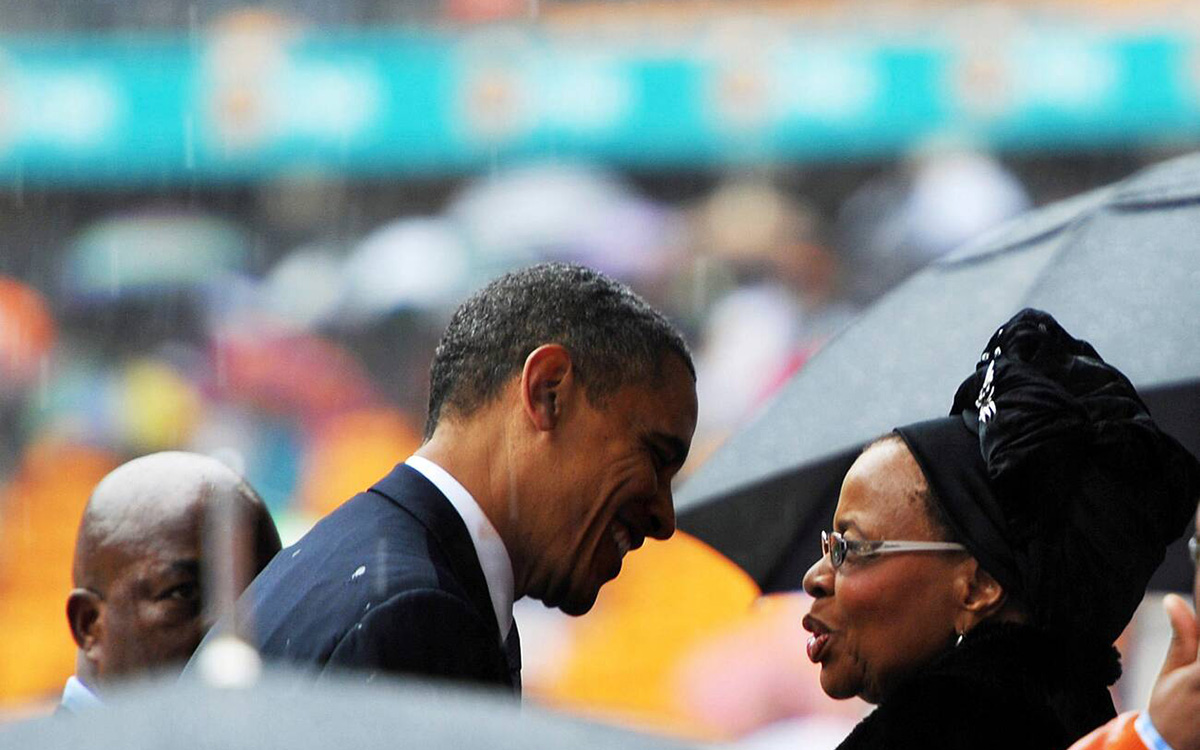
U.S. President Barack Obama with Nelson Mandela’s widow, Graca Machel, at Mandela’s memorial service shortly after his death, in Johannesburg, South Africa.
Gallo Images / Alamy Stock Photo
South Africa: Mandela’s Funeral
KATHRYN PONGONIS
While serving as deputy political counselor at U.S. Embassy Pretoria, I was proud to be part of our embassy team supporting President Obama’s participation in South African President Nelson Mandela’s memorial service on Dec. 10, 2013.
More than 90 heads of state and government, 30 retired presidents, and leaders of 20 international organizations, among countless others, commemorated the life of one of the greatest statesmen and peace builders of our time, who in his book Notes to the Future said: “It is in your hands to create a better world for all who live in it.”
China: American Flag in Guangzhou
DONALD M. BISHOP
In 1998, in the elevator of the White Swan Hotel, near the American consulate in Guangzhou, I met two American couples with newly adopted Chinese daughters in new strollers. I greeted them, guessing they must be there to apply for the infants’ visas. One woman told me of her exasperation with the process.
When they arrived at the orphanage, she said, the paperwork was confusing, and they had to stay two weeks in the small city, long delaying their return to the U.S. When they finally got to Guangzhou and wheeled the child to the consulate, the new mother said, “I saw the American flag, and I broke down and cried.”
Worldwide: No Need to Pull Strings
EVA J. GROENING
I am an immigrant. Because of my native (hard) language knowledge and an unexpected staffing gap, the State Department curtailed me from my first assignment and convinced Diplomatic Security to allow me to be transferred to my country of origin.
My epiphany of how unique the United States is, and how proud I am to be one of its diplomats, came as I was waiting to meet with the director of a leather factory, and his secretary chatted me up. She found it unbelievable that I neither belonged to “the party,” nor did my parents know “the right people”—I simply passed the exams and thus could join the U.S. Foreign Service.
Honduras/El Salvador: Preventing a Border Bloodbath
YVONNE THAYER
The refugees in Honduras had for years endured bleak conditions, threats, and forced recruitment by Salvadoran insurgents. As head of the Bureau of Population, Refugees, and Migration’s refugee assistance for Latin America, I visited the camps several times to document their desperation.
By fall 1987, some 7,000 refugees decided to defy U.N. and Salvadoran orders and return home: They would walk, babies and cooking pots strapped on their backs, to the fury of rebels and security forces alike.
A potential bloodbath was averted when Salvadoran President José Napoleón Duarte, the UNHCR (the U.N. Refugee Agency), and the U.S. agreed that the refugees would not be stopped at the border at gunpoint. Instead they were escorted to designated safe areas inside El Salvador, where they continued to receive UNHCR protection and resettlement assistance.
This precedent-setting arrangement took courage on all sides, especially from the refugees, and helped pave the way toward an eventual peace settlement.
Japan: Setting the Stage
IDA HECKENBACH
When Nancy Pelosi visited Hiroshima in 2008, I read it as a sign of more visits to come. Our public diplomacy team jumped into cultivating long-neglected contacts. We arranged an informal visit by Ambassador John Roos in 2009 that garnered great press and public approval. After I had departed post, Amb. Roos returned in 2010 for a formal visit. Secretary John Kerry and President Barack Obama came in 2016, and President Joe Biden visited in 2023.
Rarely do we get to see the results of our work years later. I am FS Proud that we set the stage for these important high-level visits to Hiroshima.
The Philippines/Hawaii: Rescuing a Peace Corps Volunteer
KATHLEEN COREY
The middle-of-the-night call in the summer of 1990 came from U.S. Embassy Manila. The New People’s Army (NPA) had kidnapped Peace Corps Volunteer Tim Swanson and was targeting other volunteers. All 264 volunteers were being evacuated to Honolulu, and I was to meet them there. For Tim’s safety, we couldn’t tell them why they’d been evacuated.
The angry volunteers boycotted the sessions until the third day, when the NPA announced it had Tim, and we could finally tell them what had happened. After several weeks of intensive work by the Embassy Manila country team, Tim was released.
Twenty years later, I mentioned the evacuation, without naming names, in an FSI leadership class I was teaching. Afterward, a regional security officer (RSO) came up and said, “That was Tim Swanson you were talking about, wasn’t it?” The RSO, it turned out, had served with Tim, who had joined the Foreign Service as a consular officer to help Americans in trouble.
Afghanistan: Raising the Flag
AMBASSADOR JEANINE JACKSON
On Dec. 14, 2001, Ann Wright, John Kincannon, and I arrived at U.S. Embassy Kabul and were greeted by security specialists and the Afghan local staff who had been custodians for the shuttered embassy for 13 years. Exploring the compound revealed surreal images of abandoned tasks, equipment, and personal artifacts, hinting at the abrupt departure of its former occupants.
Ambassador James Dobbins’ arrival marked the dawn of a new diplomatic era during a December 17 flag-raising ceremony organized by Kathleen Austin-Ferguson. Congressional delegations (CODELs) Frank Wolf, Joe Biden, and John McCain, plus General Tommy Franks and Secretary of State Colin Powell, promised U.S. support to President Hamid Karzai. Marines, plumbers, security, and development experts arrived. Ambassador Ryan Crocker assumed charge. My career total of embassies opened and reopened: 16.
Cuba: U.S. in the News
LYNN W. ROCHE
Communication with Cuban citizens, most without access to the internet, was challenging. In February 2013, we proposed a media interview about visas, a subject of great interest to Cubans, that was accepted by the government newspaper Granma. This unprecedented engagement with regime-controlled Cuban media ran as a full-page article that was later broadcast on state news, reporting the consul general’s remarks accurately and respectfully.
Our team achieved what was normal almost anywhere else in the world. It didn’t open the floodgates, but it did highlight our mutual interests and showed the human face of the U.S. government to Cubans.
Tunisia: Inspired by a Revolution
AMBASSADOR GORDON GRAY
I was never prouder to be part of the Foreign Service than during my tour in Tunisia at the very start of the Arab Spring. I witnessed FSOs support and protect the American community with tremendous dedication and empathy. I appreciated how entry-level officers and seasoned FSOs worked seamlessly and creatively to recommend effective ways the United States could support the revolution and subsequent transition away from decades of autocratic rule.
And I was inspired as I saw our Tunisian colleagues blossom and flourish when they spoke their minds freely for the first time ever.
Cameroon: Defending LGBTQ+ Rights
ERIC SALGADO
While serving as human rights officer in Cameroon in 2018, I received information from a colleague that an HIV-positive LGBTQ+ Cameroonian had been arrested after being bamboozled on an online dating platform. The person thought they were going on a date and ended up being assaulted and jailed because of their sexuality.
Learning that prison authorities denied this individual their antiretroviral medication, I called the regional governor to convey U.S. concern for the individual’s health and due process. The individual was not released, but my intervention resulted in them receiving life-saving medication; the Cameroonian government also committed to guaranteeing the individual’s due process, understanding the United States would be paying close attention.
That day, and always, I’m deeply proud to represent the United States.
Suriname: Overturning a Coup
STANLEY MYLES
It was Christmas Eve, 1990, and I was serving as chargé d’affaires in Paramaribo when the head of the Surinamese army unexpectedly forced the civilian government to relinquish power.
Immediately, and during the weeks that followed, I worked to ensure the safety of my staff while drafting recommendations to the department to reverse the coup. With pressure from the members of the Organization for American States and the Dutch, less than three months after the coup the army agreed to permit new elections. At that point, our mission welcomed a new ambassador, and I returned to my deputy chief of mission role.
It was the accomplishment I’m most proud of in my Foreign Service career.
Worldwide: New Customs
JUDY CHIDESTER
I joined the Foreign Service in 1960 at the age of 21. I loved it from the minute I arrived in Washington, D.C., and throughout my 35-year career. What makes me FS Proud is not any particularly significant diplomatic event but the fact that I did my job, first as a cryptographer and later as an information management officer, knowing that I represented the United States wherever I lived.
I made myself aware of any differences in culture at every post and made every effort to honor the host country’s ways. I worked long hours and worked hard, knowing that the way I did my job could affect the opinion citizens of my host country might have of the United States and the Foreign Service. Along with this I enjoyed mightily learning of these various customs and meeting the people who lived there. It was such a wonderful career, with opportunities for training between tours so that I never felt stagnated.
Latin America and the Caribbean: Clean Water and Paved Roads
SONNY LOW
I worked at USAID’s Office of Housing and Urban Programs, helping manage the design and implementation of the agency’s housing guaranty loans and technical assistance. The loan program enabled countries benefiting from USAID foreign assistance to borrow from U.S. banks at commercial interest rates—like any of us seeking a 30-year mortgage to buy a house in the U.S. The U.S. dollar loans are backed by a U.S. government guarantee, ensuring the borrowing country will not default on them. Loan recipient countries use this money to engage in international business.
At the same time, the dollars acquired are converted into the country’s local currency, financing housing projects and improvement of infrastructure services such as connecting potable water to homes and paving streets in low-income neighborhoods. Families served by these programs pay back the local institution that loaned the money for their new homes or improved neighborhood services.
I was proud to be part of this program. During my 26-year career with USAID, thousands of affordable houses were built, and hundreds of neighborhoods received potable water and paved streets in Honduras, Ecuador, Chile, El Salvador, Jamaica, the Dominican Republic, Bolivia, Peru, Panama, Paraguay, Mexico, and Guatemala.
Japan: Hole in the Ozone Layer
WILLIAM MCPHERSON
I was posted to Japan as an environment, science, and technology officer, from 1986 to 1987, when the Montreal Protocol was negotiated. There was resistance from Japanese industry, but when the British chemist Bob Watson presented his findings on the hole in the ozone layer, that resistance melted away.
I am proud of the role of the Foreign Service in providing the scientific basis for negotiations on environmental agreements. We may not be the experts, but we have the ability to identify people like Bob Watson and arrange for them to share their work with foreign governments at the optimal level and timing.
Worldwide: Proud of Our Local Staff
DALE GIOVENGO
Our mission, ultimately, is to make the United States and its citizens safer and more secure. We do this in many ways: economically, militarily, culturally, and, of course, diplomatically. I served in five posts in various roles, as both an officer and a specialist. At every post, I relied heavily on, and was always impressed with, our locally employed staff. I am most proud of them and the way the department includes these folks in our mission and as an extension of our culture. They remain at post when we move on and are our best representatives, doing outreach wherever we are located.
Romania: Unexpected Thanks
JONATHAN B. RICKERT
Through a series of happenstances, I spent about a third of my Foreign Service career in various roles in or dealing with Romania. I participated, with many others, in Romania’s evolution from communist dictatorship to emerging democracy and staunch NATO and European Union member.
Therefore, it was particularly gratifying when, at the termination of my second Bucharest assignment in 1995, Foreign Minister Teodor Melescanu wrote me a letter expressing his and his ministry’s “cordial thanks and complete gratitude for your exceptional contribution to the development and amplification of Romanian-American relations in all areas of common interest.” Totally unexpected but very welcome.
Afghanistan: Tragedy and Solidarity
BRUCE K. BYERS
Valentine’s Day, 1979. Ambassador Adolph Dubs was abducted on his way to work and held captive in the Kabul Hotel by unknown men. Everyone at the embassy worked to gain his freedom. Despite our efforts to negotiate with the foreign and interior ministries, Amb. Dubs was murdered in the hotel room by his abductors a few hours after his capture; the embassy doctor later confirmed this.
We were shocked and devastated, but our Foreign Service family rallied in this chaotic time of violent uncertainty. The entire diplomatic community expressed solidarity with us and outrage at the Afghan government’s response. They supported our efforts to move forward under extreme conditions, and move forward we did.
Worldwide: IMS Supports the Mission
MARK “ANIMAL” JENNINGS
I am proud of completing a temporary duty assignment (TDY) from Managua to Port-au-Prince just after the 2010 Haiti earthquake for a month. I am proud of offering TDY support to Malabo, Equatorial Guinea, from Yaoundé. I am proud of using my language skills to support the FS mission worldwide despite being told: “Information management specialists do not have a need to speak the local language; they never talk to outside contractors.”
Brazil: The Durability of U.S. Assistance
EMILIO IODICE
In 1982, I went to Brazil as a commercial counselor. My role was to expand exports and business with Latin America’s largest nation, and I searched the country for opportunities for U.S. firms and Brazilian partners.
In the hinterlands of the Northeast, the challenge was water. Poor farmers bought water from merchants to survive. In the countryside, however, I discovered estates with green fields filled with fruits and vegetables. The Peace Corps, said the farmers, had dug artesian wells in the 1960s. The wells were sunk into underground rivers. Local and national politics had ended the effort. Yet decades later, those wells still provided sustenance to the area.
As we returned to Brasília from the Northeast, our plane flew over that oasis in the desert. At that moment, I was proud of the FS and of being an American.
Canada: Ready for Y2K
AMBASSADOR LISA BOBBIE SCHREIBER HUGHES
I was always proud to serve our country, to contribute, to “serve” rather than merely “work.” As a second-tour staff assistant, I described my job as “photocopying for my country.” Irony aside, I’ll relate one potentially historic event.
At the turn of the last century, all were seized with concern over “Y2K.” What would happen to communications? Health care? Safety, security, national defense? No one knew. In response to this possible threat, all diplomatic missions worldwide stood ready at midnight on Dec. 31, 1999, to report back to the Operations Center on the state of our posts.
I was principal officer in western Canada (Calgary), surrounded by a satellite phone, a cell phone, and a landline. The clock struck midnight. All systems were fine, as we reported back to the OpsCenter. Y2K was a nonevent. Nevertheless, I felt pride in being there for my country, should she have needed me.
Yugoslavia: Reversing a Visa Denial
BOB RACKMALES
My proudest moment came while serving as consul in Zagreb in 1969, when I reversed a long series of visa denials to a former auto worker in Michigan. He had returned to his native country after World War II, but his repeated efforts to rejoin relatives in the U.S. were thwarted by a succession of consular officers who based their decisions on the existence of a lengthy FBI report concerning him.
After reading the report I concluded, and convinced the department, that it contained nothing that would serve as grounds for visa denial. My pride in this outcome was tempered by regret that it was so long in coming.
Haiti: Common Ground
TOMMYE GRANT
One of the nicest things about being in the Foreign Service is the opportunity to work in foreign countries and interact with their citizens, where you will find mutual desires for global peace and prosperity.
My first assignment, to Port-au-Prince, reflected this when no matter who I met—office mates to neighbors—all wanted a community of peace and prosperity. This belief in freedom and democracy made me want to work harder to help them achieve these basic human rights that unite, not divide, us. What I did made friends for America, and these friends strengthen us.
Peru: To a Land Without Fear
JEAN PRESTON
I was handling immigrant visas in Peru in the mid-1980s. One day as a Peruvian couple with two little girls entered my booth, an angry client pounded on a nearby counter, yelling, “I’m an American citizen! I’ve paid my taxes! I demand service!”
One of the girls, her eyes wide with fear, asked her father, “Daddy, will the police throw that man in jail?”
Her father replied, “No, my daughter, that is why we are going to the United States, a country where people can demand their rights without fear.”
My heart swelled with pride in my country and in my role.
Lebanon: Aftermath of an Assassination
GEORGE B. LAMBRAKIS
In June 1976, as acting ambassador (chargé d’affaires) during the Lebanese Civil War, I led our embassy in preventing a hasty U.S. Marine landing in Beirut after the assassination of our newly arrived ambassador, Francis Meloy, and two others. With Secretary of State Henry Kissinger pushing for the mass evacuation of Americans, the U.S. Navy was quietly mobilizing Marines to land and protect them.
Tipped off by the British, who had learned of these plans and opposed them, I immediately sent a “flash” message (supported by our embassy’s military attaché) to the department pushing for a peaceful evacuation instead.
Thanks to timely action by the Near East/South Asian bureau in Washington, as President Gerald Ford was considering the Navy’s plans, my telegram resulted in the Navy’s peaceful evacuation of nonessential embassy personnel and all willing American citizens under the armed protection of the Palestinian, Druze, and Sunni Arab militias who then controlled western Beirut.
Afghanistan: Email from a Child Bride
STEPHANIE STRAFACE
In 2017, when I was serving as the American Citizen Services chief in Kabul, my intuition about a cryptic email resulted in a mission to rescue a young woman—born and raised in the United States, but sent to marry in Afghanistan at the age of 14—and her 5-year-old daughter, both held against their will for years in rural Afghanistan. We were very proud of the work we did to rescue this young American and her daughter. Years later, I would attend her true wedding and watch her family continue to grow, now safe in the United States.
Worldwide: First-Generation Diplomat
DIANE FISCHER CASTIGLIONE
I am a first-generation American—the child of refugees from Nazi Germany and the first in my immediate family to go to college. Upon joining the Foreign Service, I marveled that I was a United States diplomat. I didn’t come from privilege, nor did I have connections who could help me enter diplomatic service.
To me, this speaks volumes about what the United States represents and what it meant for me to represent the United States. Working at the Department of State, on behalf of the American people, was a remarkable opportunity. I am proud and honored that I could do so.
Thailand/Vietnam: Welcoming Refugees
SUE H. PATTERSON
Shortly after the South Vietnamese government fell in 1976, hundreds of thousands of South Vietnamese fled the country in small boats. Many drowned, but many thousands also survived, arriving in nearby countries after harrowing journeys. Most of the surviving refugees languished for months, years, or even permanently. The U.S. government created the Orderly Departure Program, located in Bangkok, to encourage Vietnamese with some connection to the U.S. to wait in Vietnam until they could be assured the U.S. would accept them.
Together with the UNHCR, the Visa Office took the lead in establishing and running the program for several years. I was intimately involved, working from the Visa Office, and immensely proud of how many lives were saved and how many outstanding Vietnamese were accepted safely into the United States, where they have become U.S. citizens and enriched culture and education.
Holland: In the Aftermath of 9/11
JAMES B. GRAY
The exceptional privilege of being a Foreign Service officer includes the exceptional privilege of representing and serving the United States. In response to the tragedy of 9/11, Amsterdammers brought hundreds of bouquets, surrounding the perimeter of our consulate general in a floral tribute.
At noon on the Friday after the attacks, several thousand Dutch filled the adjacent Museumplein for three minutes of silence, at the end of which there was a thunderous round of applause. A very large Dutch policeman standing next to me stated quietly: “That was special.” Thank you, Holland, and may God bless the U.S.A.
Kyrgyz Republic: Special Needs Orphanage Renovation
BRENDA GRAVES
Far outside the capital city of the Kyrgyz Republic, there was an orphanage for children with extreme medical and developmental needs, who were unseen and forgotten by the Kyrgyz government.
In 2010, as a first-tour officer in Bishkek, I discovered the department might provide humanitarian assistance, and I submitted a grant proposal for bathroom renovations at the out-of-the-way orphanage. The renovations were approved, yet hopelessness lingered in the orphanage director’s eyes. Her special-needs children’s home had never been anyone’s priority.
But when ribbon-cutting day arrived with lots of media attention on this little orphanage, exhilaration replaced hopelessness in the orphanage director’s eyes. With the helping hand of the U.S., finally, the needs of these children would be seen and met.
Guatemala: Ongoing U.S. Assistance
BARBARA ELLINGTON BANKS
The Guatemalan Ministry of Finance asked, in 1990, whether USAID-originated funds remaining in old trust funds we’d established in local currency 20 years before—more than $20 million—could be spent. No, we told them—but the funds could be restructured. It took weeks to create one mega fund and turn it over to the country! The president inaugurated the program with the ambassador and USAID Administrator, and the fund remains in operation today.
Washington, D.C.: My 800-Person Poem
[HUI JUN] TINA WONG, AFSA STATE VICE PRESIDENT
I am FS Proud … of standing up for what’s right! As former president of the Asian American Foreign Affairs Association, I led the effort to bring more than 800 employees together to add their voices to a video collection of the poem, “Clap for Me Now.” The video, celebrating the achievements and heroism of our Asian American frontline workers and diplomats who experienced COVID-related stigmatization and discrimination, went viral.
Kenya: Dancing for the President
EDWINA “EDDIE” SAGITTO
On the way to the hotel for my temporary assignment in Nairobi in June 2015, we passed several huge billboards proclaiming: “Welcome Home President Obama!” The driver asked if I was in town for President Obama’s visit, and when I answered that I was, he thanked me profusely for bringing Obama to Kenya—an experience that was repeated throughout my stay. I was the on-site press officer for Air Force One arrival and departure, making sure that journalists were credentialed and in place.
On the final day of the president’s visit, the crowds wishing to see him began to gather early at the airport. I was surrounded by groups of dancers wearing the colorful clothing of the various ethnic groups and tribes of Kenya. They danced for hours, hoping to get a glimpse of Obama before he left. He rewarded them with a wave, while I have the enduring memory of their excitement and their beautiful dancing.
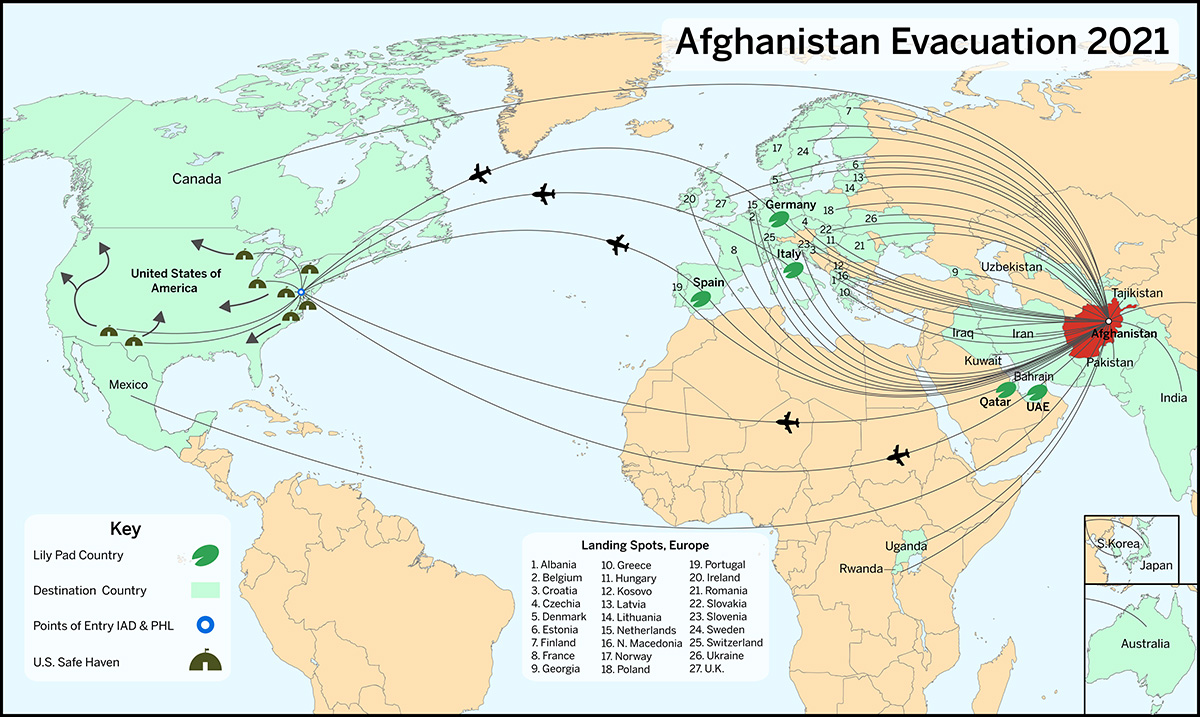
This map shows the movement of Afghan evacuees across the globe in the immediate aftermath of the U.S. withdrawal from Afghanistan in 2021.
Chad Blevins / FSJ
Afghanistan: At the Airport
SCOTT WEINHOLD
August 2021, the Kabul International Airport: A couple dozen members of the U.S. Embassy Kabul team, who volunteered to stay behind when their colleagues were evacuated, were joined by more than 100 State colleagues flowing into a dangerous war zone. None of them knew, or asked, how things would work, whether they would be safe, or even how long they would be there.
They simply knew there was a desperate need for help, and they stepped up. Every part of the Foreign Service worked arm in arm with our Defense Department colleagues to save more than 124,000 Americans, allies, and Afghans. I’ve never been more proud of the Foreign Service.
Afghanistan: Behind the Scenes for Kabul
ALAN EATON
After the fall of Kabul and the sudden evacuation out of Afghanistan, the consular team that flew into Kabul worked under immense pressure to facilitate the departure of more than 124,000 people. All along we knew that our colleagues were waiting at various points in Germany, Spain, United Arab Emirates, Pakistan, Albania, and Washington, D.C., to assist these evacuees. In Kabul we didn’t know where the evacuees were going to land, but we knew our colleagues in the Foreign Service were diligently working behind the scenes to help people to safety.
Vietnam/Switzerland: A Standing Ovation
AMBASSADOR KENNETH M. QUINN
In the aftermath of the Vietnam War, individuals began escaping on small boats in search of freedom. In 1979, however, no country, including the U.S., was accepting any more refugees from Indochina. Refugees were drowning at sea. While on a Pearson Fellowship to Des Moines, I urged Iowa Governor Robert Ray to issue a public appeal and to lobby President Jimmy Carter to reopen America’s doors. Amb. Richard Holbrooke and FSOs at State like Frank Wisner and Lionel Rosenblatt added critical support.
A few months later, I was at the July 1979 U.N. Meeting on Refugees and Displaced Persons in Geneva when Vice President Walter Mondale announced that the U.S. would accept 168,000 new refugees every year. The “boat people” were saved! With the exception of the communist delegations, every country’s representatives gave a spontaneous standing ovation to the United States for our humanitarian life-saving leadership.
The Philippines: The Golden Plow Award
KENNETH F. SMITH
Fifty years ago, in a ceremony at Malacañang Palace, USAID received a “Golden Plow” award for international understanding from President Ferdinand Marcos for assistance to the Philippines as it recovered from the worst flood in the country’s history to avert nationwide famine.
Providing commodity and technical assistance, the “shirt-sleeved diplomats” and consultants of USAID/Philippines worked closely with our Filipino counterparts on a “Green Revolution” recovery program, “Masagana 99,” using high-yielding rice varieties that produced up to eight times more rice than the then-prevailing national average.
Türkiye: Earthquake Response
HEATHER BEGGS
I’m FS Proud of my local management team at Consulate Adana—the heroes who in 2023 ensured $285 million of U.S. government earthquake assistance reached the people most affected. When hours and minutes mattered, our consulate team worked late into the night, day after day, supporting the requirements of USAID search-and-rescue teams and a disaster assistance response team. Their dedication enabled U.S. rescue teams to save lives and ensured disaster assistance arrived quickly to survivors, while they themselves slept in cars or offices until their homes were deemed safe. I will never forget the courage and compassion of our team.
Worldwide: Grateful
SIENA FLEISCHER
I’m FS Proud of the permission granted me to live alongside our global community, to learn together as neighbors, celebrate progress, witness disasters, then rebuild together. A life of service becomes a way of gaining more than you give, new wisdom to be a better human.
Journeying across three continents in the last decade, I am grateful for the opportunity to share the world with my daughters and to watch their tolerance grow as their cultural lexicon expands.
USAID meets communities where they are, designing and delivering assistance tailored to current needs, alleviating struggle, and opening the aperture for a better future.
When sharing or linking to FSJ articles online, which we welcome and encourage, please be sure to cite the magazine (The Foreign Service Journal) and the month and year of publication. Please check the permissions page for further details.



